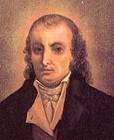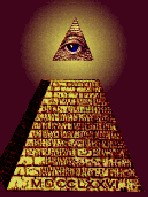History Of The
Bavarian Illuminati
 Adam
Weishaupt, the founder of the Bavarian Illuminati(Frater Spartacus,
1748-1830) was born on February 7, 1748, in Ingolstadt, Bavaria.
He was educated by the Jesuits. He was appointed as Professor
of Natural and Canon Law at the University of Ingolstadt in
1775. Adam
Weishaupt, the founder of the Bavarian Illuminati(Frater Spartacus,
1748-1830) was born on February 7, 1748, in Ingolstadt, Bavaria.
He was educated by the Jesuits. He was appointed as Professor
of Natural and Canon Law at the University of Ingolstadt in
1775.
Weishaupt joined the Freemasons in 1774, but
quickly became disillusioned and dropped-out.
On the first of May, 1776, Weishaupt founded
the Illuminati, created based on the organization
of a secret student society. The original group
consisted of only 5 members who were devoted
to promoting equality and rationality, originally
through study but later through more active and
revolutionary means. By 1779 there were cells
of the Order in five Bavarian cities, the secret
library contained much contraband literature
and membership numbered about 54. Members were
all considered "Initiates", and they
were brought slowly to higher grades of knowledge.
Activities of the Order were conducted under
assumed and symbolic names (Weishaupt called
himself "Spartacus") and only the highest
Initiates could learn of the "Secret
Directors" (the "Areopagus")
who knew the founder's identity and the true
history and aims of the Order.
In 1777 Weishaupt had rejoined the Freemasons
in hopes of gaining useful lore for his own Order
and in hopes of finding potential new members
for the Illuminati. Whether by original design
or evolved purpose, the idea was conceived for
Illuminati members to infiltrate the highest
Masonic grades to take control of the Lodges.
In this way, Masons receptive to Illuminati ideas
could be initiated into the highest Orders and
less receptive members left to the lower Orders
and subjected to more limited information..
 In 1779 the Masonic Lodge in Munich supposedly
succumbed to the plans of the Illuminati. At
the same time, this branch of the Masons was
given authority by the English-authorized Frankfurt
Lodge to set-up daughter Lodges, which it did.
By mid-1782 the Illuminati numbered about 300
men, and may have included Goethe & Mozart.
In 1783 it spread to Bohemia & Milan, and
then to Hungary. In 1779 the Masonic Lodge in Munich supposedly
succumbed to the plans of the Illuminati. At
the same time, this branch of the Masons was
given authority by the English-authorized Frankfurt
Lodge to set-up daughter Lodges, which it did.
By mid-1782 the Illuminati numbered about 300
men, and may have included Goethe & Mozart.
In 1783 it spread to Bohemia & Milan, and
then to Hungary.
In 1784 one of the highest Initiates defected
from the conspiracy and made public some dramatic
tales of his experiences and information about
the Illuminati. As the story goes, the Bavarian
Elector published an Edict forbidding secret
societies, and Weishaupt went to him in an attempt
to explain the Illuminati...... not a good move.
As a consequence the Elector issued a new Edict
explicitly condemning Freemasons and Illuminati
on religious, social and political grounds. Weishaupt
fled and the Illuminati supposedly was disbanded..
But did the Illuminati really disappear from
history's stage? Many think not..........
Due to the controversial nature of Weishaupt's
ideas and the actions of the Illuminati, all
kinds of conspiracy theories surrounded the mysterious
organization. In 1797 a Jesuit, Augustin de Barruel,
wrote a book asserting that the French Revolution
was the product of a carefully planned plot --
and that behind the Jacobins were the Freemasons
and (above all) the Illuminati. Later, the British
authoress Nesta Webster in World Revolution,
the Plot Against Civilization (London, 1921)
attributed every revolutionary upheaval from
1789 to the Illuminati -- and she considered
Bolshevism & Zionism to spring from the same
source. Since that time, literally hundreds of
books and publications have outlined the supposed
conspiracies of the Illuminati.
Many conspiracy theorists still regard the
Illuminati as a living and functioning organization,
with plans and goals for the entire world......
negative or positive plans..... depending upon
your viewpoint. |